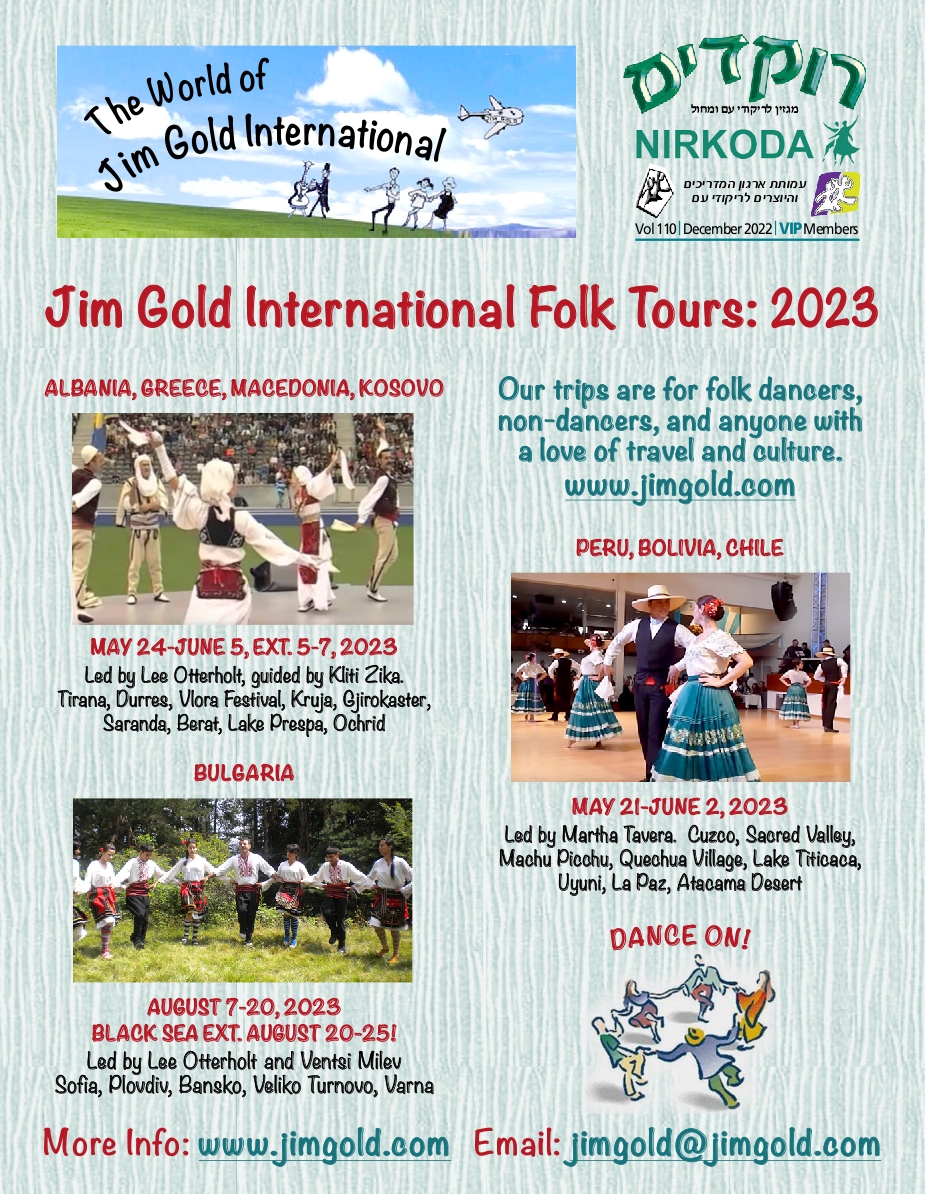- Home
- Rokdim Nirkoda 110
- Royalties for Folk Dances – Yes or No?
Royalties for Folk Dances – Yes or No?
A Survey of Readers and Their Reactions
- Translation: Dena Matmon
- Translation: Alex Huber
“Copyright”: a payment for the use of something that someone else authored/composed/created. It is a mechanism initiated by democratic regimes out of respect for the creators and to permit them to take pleasure from their creations (large or small). These rights exist and are used as buyers’ rights in a free market. They are not something that we can decide if we want or don’t want to pay for them. The holders of copyrights for songs and compositions (and yes, for dances) can’t use these rights individually, only through an organization that unites all those interested (like ACUM for poets and composers). Dances do not yet have this possibility.
“Copyright” is given by law to all those who compose/do something that many other people use and enjoy. And money is paid to use them. It doesn’t matter if this is a long and complicated symphony or a song that is played on the radio or some dance steps that don’t ever change.
A detailed article can be found in Volume 109 here.
“Copyright” for music used in public places is generally paid annually by the municipalities, community centers, universities, coffee houses, restaurants and any other institutions that play music for their patrons all year round. Dances should be paid for in the same manner and preferably through ACUM.
Following are some of the responses to my article and to my internet survey:
ACUM: Welcome the initiative
In past years several attempts were made to permit the creators (choreographers) to become members of ACUM and to defend their rights to “copyright”. Unfortunately, these attempts were not successful.
ACUM will gladly once again meet with the representatives of the choreographers and discuss the matter again, in order to add folk dances to the base of creations protected by ACUM. Thus, royalties could be collected for the use of the dances and the songs, and would be transferred to the creators.
At your service for any matter….
Moshiko HaLevy: Royalties for Choreographers – No, No.
Folk dances are choreographed with the intention of bequeathing them to the people. No other country has set such a precedent – payment to choreographers!!
Composers of popular dances in Israel are invited to teach them in other countries and are paid well for their work. They earn with dignity. Here we’re not talking about one trip a year. I am acquainted with and know a good number of choreographers who are invited abroad several times a year and they make good money.
Over the years we created a format (I was one of the founders) and most of the choreographers gained from it. It’s true that we choreographed the dances, but the dancers themselves helped to publicize them.
The moment it’s decided to pay royalties to the choreographers, we will lose our sacred purpose of “developing a dance culture” and we will witness the opening of an industry to choreograph dances the same way that moving pictures suddenly appear. Tens of choreographers will look for the royalties.
I don’t know where the idea came from to pay royalties to choreographers and what the cause was of this kind of thinking. From the beginning the choreographers were interested in being recognized by the dancers and not in order to receive some kind of prize. If he succeeded, the choreographer received respect and appreciation, which are more important than the amount of money he might have received from a body like ACUM.
Dear friends, I personally totally object to the idea of royalties for choreographers. In spite of the fact that the number of dances I have choreographed can earn me a very respectable sum, I’d rather not lose respect because of money.
The Dancers’ Organization: Under no circumstances!
The world of folk dance needs the continuation of creativity in order to refresh and to renew itself. But everything needs to be done in moderation. Unfortunately, active choreographers and those who aren’t quite as active put together hundreds of new dances every year. The background for this is mainly to become known and to reach as large a dance audience as possible. And here begins a web of pressures on the genuine choreographers to teach new dances, even if their quality and level aren’t so high.
Today, even before the thoughts of royalties, we’ve reached a point where dancers are unable to move from one dance session to another because the repertoire is different at each session.
To our sorrow, there is no mechanism of regulation and sorting which would lessen and determine the number of new dances that the branch can handle each year.
The matter of royalties will only increase the destructive process that we are now witnessing, In addition, it will significantly increase the number of new dance creations. We need to remember and to remind people that the intention of folk dances is to be a kind of cultural activity for the people, connecting various parts of the country and of the world. Slowly but surely folk dances have turned into a source of infinite financial income. And the dance community is paying the price.
If this proposal is accepted, it can be assumed that in addition to the entrance fee to the dance sessions – which is already too high – the dancers will need to pay the expenses of the royalties.
In our opinion, there are many insoluble legal problems here (dances are not songs and they aren’t heard as are songs). There are also financial and organizational aspects, the matter of copyright, for example, for all the dances that have been choreographed up to now and made public, with the intention of using them freely for the entire population.
We disagree with the proposal which may make life better for several choreographers, but will translate into great destruction and will hurt the tens of thousands of dancers in Israel and around the world and will destroy the entire branch.
With thanks, The Dancers’ Organization
The Survey
The anonymous survey on the site included 330 readers, separately in Israel and abroad. Many even went to the trouble of adding their own opinion, a sign that this is important to them. Our thanks to all of you who wrote to us. I was touched by the care that you demonstrated. Everything is interesting, but it’s impossible to present all of the responses. I have therefore chosen the most interesting ones (see below).
198 Readers in Israel Responded to the Survey

Most were against the idea – 56% opposed to 37% that chose in favor and 7% who have no opinion on the matter. 60% didn’t bother to read the article.
Among the responders only 40% read the article as opposed to 60% who didn’t bother to read the article.
In your opinion, should we progress the regulation of royalties for use of folk dances (198 responders).
132 Readers Abroad Responded to the Survey

Here there was a tie score: for the idea 46% against 44% against and 10% with no opinion. 56% read the article as opposed to 44% who didn’t.
Do you think that an arrangement of royalties for the use of folk dances should be promoted (132 responders).
There is more awareness for the need for royalties outside of Israel. It should also be noted that dancers-voters abroad related more seriously to the question and took the time to read the article.
I would like to change two terms when we deal with this (and this isn’t just semantics):
- Instead of “creator” I suggest the word “Choreographer”, “Rikudai”, “Composer”.
- Instead of “Markidim” I suggest “Instructors” (as it was in the past).
Here are some of the responses I received:
- If we start with royalties, the dances become more “political”, commercial and uglier than what they are today. There’s no money in it and the change will only make the situation worse, in my opinion.
- Choreographers deserve royalties no less than poets and composers who do receive royalties. The choreographers worked hard and there’s no reason for them not to enjoy the fruit of their work over the years.
- How can you pay royalties for a Yemenite step, or a cross-over? In most of the dances 90% of the steps already exist (copied) from previous dances.
- In my opinion, every choreographer, just as any other service provider, should receive recompense for his asset, if we used it.
- This will make certain dance leaders use only their own dances.
- You’re looking for trouble and causing chaos.
- In my opinion dance leaders will raise the entrance fee in order to cover the royalties to choreographers and many dancers will think twice and change their financial priorities.
- There should be such a mechanism for folk dances.
- It is desirable for choreographers to be equal to other creative people. In the long run this will be good for everyone.
- In any event, this field is declining and new people are not joining. To make a living as a choreographer is not easy. So the question is, if the field is declining, why make matters worse? I suggest a nominal sum and not a high one.
- A dance is a creation just as others are and there’s no reason for the choreographer not to receive recompense.
- There are already too many new dances. If they receive royalties they’ll want to create more.
- First of all, the “dance leaders”, most of whom act only as DJs, should announce the name of the dance and the name of the choreographer before each dance. Very few of them use a projector and a screen and this in itself is recognition of the creator. Secondly, it will place an additional burden on the dancers who already pay between 30-50 shekels entrance fee, which is robbery. And third, the dance leaders pay ACUM to play the music, just as big halls do.
- And in addition, will there be an equal distribution among the choreographers about the songs or will this be a hostile takeover?
- Many artists find it difficult to make a living. If the royalties will help them, then it’s worth it. A worthy initiative.
- I have no problem with it. But the payment has to come from the choreographers and not from the dancers who already pay 35 shekels.
- I’m for it, but the mechanism must be transparent, fair and exact to a reasonable degree about the pricing.
- Regularization of royalties should come before supervision on the dances, thus encouraging the creation of quality dances.
- The choreography of a dance is an artistic creation that we all enjoy. Choreographers who contributed during most of their working years to enrich our culture and our quality of life, who choreographed dances that we perform over and over – they certainly deserve a significant income from their creations – especially as they grow older.
- For many years the dance leaders paid no attention to copyright and, without limitations, used the various recordings of songs according to the dance. Thus it is now clear to me that there should not be regulation of royalties for the use of folk dances.
- There should be royalties. But as with every product (as good as it may and as well known, or the opposite), and after creating a proven measure of its quantitative use (above a certain level) for a period of at least two years and not royalties that fly up and down the scale.
- Whoever works and bothers and builds “something from nothing” deserves recompense. And other people enjoy his product.
- The great investment in composing a dance (especially one of quality) demands this!!
- A spiritual asset must be protected by law and my husband and I need to receive compensation according to law.
- Royalties will take this wonderful branch of the real Eretz Yisrael to another place that in the end will make the branch collapse. This is a lose-lose-lose situation. In the end we will all lose: the creators, the dance leaders and the dancers.
- Unnecessary! The average level of the dances is very low. There are too many dances that we learn and after a short time they disappear. The world of folk dancing is similar to Babel. There are dance leaders who lead their dances ahead of dances by other choreographers. It’s unnecessary to do something as serious as giving recompense for folk dances. Small Israel is unknown to other nations in this field. There are 10,000 folk dances, most of which are unknown and never danced. We are record breakers in the world of “confusion” in a field which should be very respectable, but has partially turned into a low and unfair position.
- Folk dances are a necessary part of culture. There’s no need to put sticks in their wheels to make difficulties. It should all be free, transparent and open in all the parks and in places accessible to everyone. The government must finance the folk dance culture from a very early age. Everyone involved in the field must deal with it for free, and with a feeling of being on a mission with great love.









Comments
התראות